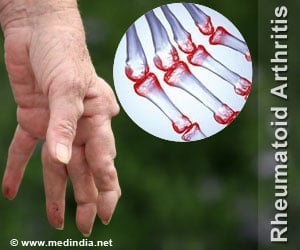The use of drugs that block interleukin -1beta could increase the risk of invasion by flesh eating bacteria by 300 times in rheumatoid arthritis patients.

- Rheumatoid arthritis (RA) is the most common type of autoimmune arthritis
- Common causes of RA include genes, hormones, viral and bacterial infections
- Anakinra drug blocks protection against infectious bacteria in RA patients
Interleukin-1beta
TOP INSIGHT
Interleukin-1beta provides protection against certain invasive bacteria
Rheumatoid arthritis causes joint swelling, pain and stiffness and the severity of the disease varies from one individual to another, from mild to moderate to severe.
The study was conducted by the University of California San Diego School of Medicine and the lead author of the study Dr Victor Nizet said “The more we know about each step in the body's immune response to bacterial infections, the better equipped we are to design more personalized, targeted therapies for autoimmune diseases therapies that are effective, but minimize risk of infection."
Anakinra
Anakinra is a drug that is used to treat rheumatoid arthritis patients but results in the production of adverse effects, according to FDA. This drug acted by blocking the effects of Il-1beta to control the immune response in rheumatoid arthritis patients.
The protection that is provided by IL-1beta against pathogenic bacteria is extensive and cannot be masked under an attempt to treat rheumatoid arthritis. This study reveals the harm it could lead to when highly infectious flesh eating strains of Streptococcus infect rheumatoid arthritis patients who are on IL-1beta blocking medication.
Interleukin-1beta is secreted in an inactive form and is cleaved by an enzyme secreted by the body into its active form.
Interleukin-1beta calls the white blood cells to the site of invading pathogens, aiding in mounting an effective immune response.
When the researchers studied the effect of SpeB enzyme that was secreted by the StrepB bacteria, they found that it cleaved IL-1beta which activated a protective immune response.
Dr. LaRock also said "This finding may explain why some of the more invasive, flesh-eating strep strains have a genetic mutation that blocks SpeB production -- it helps them avoid tripping the alarm and setting off an immune response."
Advantageous for Less Infectious Variants
Activating the Il-1beta would be advantageous for strains of Streptococcus which were not very invasive as the immune response could remove all competitive strains. The increase in immune response could result in over activation that results in the body’s immune response turning against its own cells like in rheumatoid arthritis.
Causes for Rheumatoid Arthritis
Rheumatoid arthritis may be caused due to any one of these factors or a combination of these
- Genes: Individuals with the HLA shared epitope have a 5 times higher risk of getting rheumatoid arthritis. TRAF1 and C5 which are associated with chronic inflammation have also been implicated in rheumatoid arthritis. STAT4 plays an important role in controlling the immune system. The presence of these genes increases the risk for rheumatoid arthritis but not everyone with rheumatoid arthritis has a mutation in these genes not does everyone with these gene mutations get rheumatoid arthritis.
- Hormones : Hormones play an important role in triggering rheumatoid arthritis. 70% of individuals with rheumatoid arthritis are women.
- Viral and bacterial infectionCertain viral and bacterial infection could trigger rheumatoid arthritis.
- Environmental FactorsEmotional trauma could trigger an immune response that could lead to the development of rheumatoid arthritis.
Rheumatoid arthritis could resemble any other joint pain but is diagnosed after a physical examination, x-ray and lab tests. Medical advancements have permitted better treatment methodologies for this disease, however, in a new study, scientists have found that a specific treatment method for rheumatoid arthritis might lead to more harm than good.
Source-Medindia
 MEDINDIA
MEDINDIA



 Email
Email










